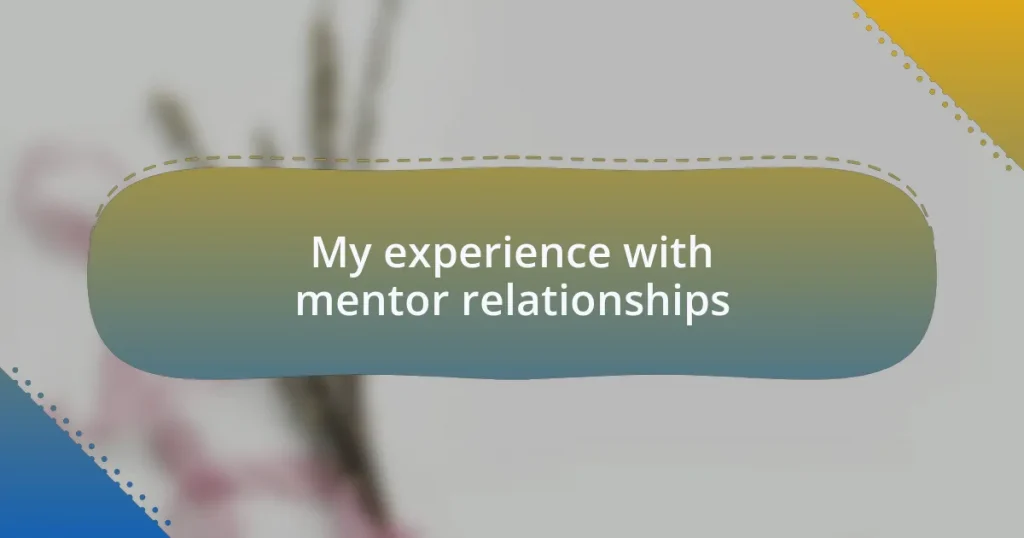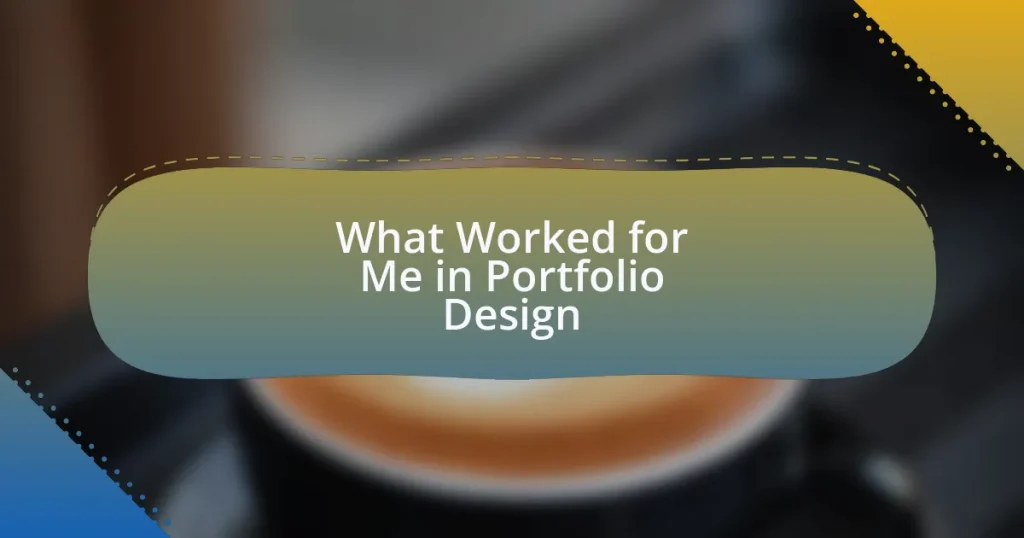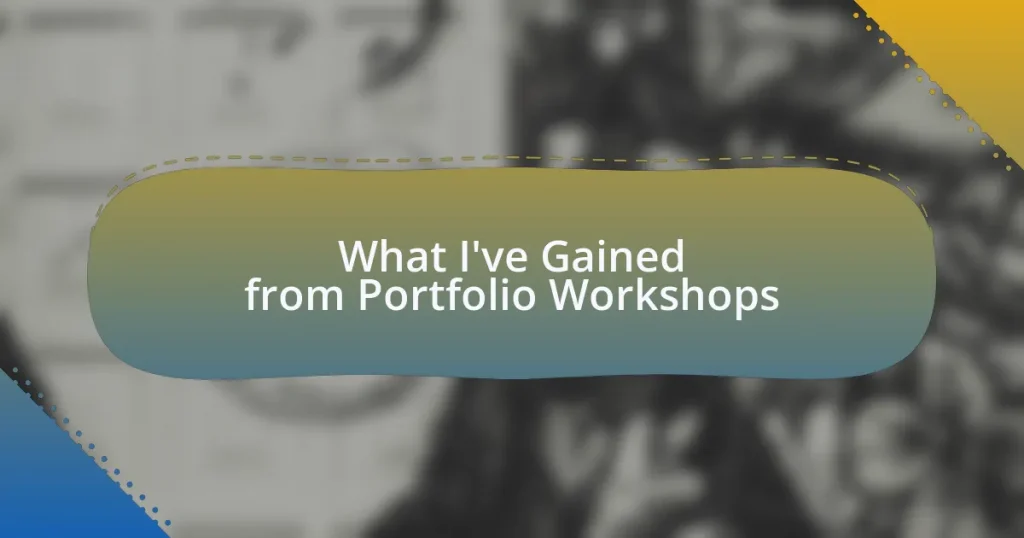Key takeaways:
- Mentorship in design fosters personal growth through constructive criticism, emotional support, and encouragement to explore creativity.
- Building strong mentor relationships requires clear communication, vulnerability, and celebrating shared successes.
- Effective communication involves not just sharing thoughts but also listening and following up to reinforce the relationship.
- Applying mentor advice, such as experimenting with techniques and embracing imperfection, can lead to significant creative breakthroughs.
Author: Evelyn Hartley
Bio: Evelyn Hartley is a bestselling author known for her gripping psychological thrillers and evocative literary fiction. With a background in psychology and a keen interest in human behavior, her novels explore the complexities of the human mind and the intricacies of relationships. Evelyn’s work has been recognized with several awards and has been translated into multiple languages. When she’s not crafting her next page-turner, she enjoys hiking in the mountains and sipping coffee in quaint cafes. She lives in Seattle with her two rescue dogs and is currently working on her next novel.
Understanding mentor relationships
In my journey as a graphic designer, I’ve come to realize that mentor relationships are like nurturing a garden. They require effort and trust, blossoming when both parties invest in each other. Have you ever thought about how generously a mentor shares their knowledge? It’s a unique bond where experience meets ambition.
I remember my first mentor, who patiently guided me through the nuances of design software. Every critique she offered felt like a puzzle piece connecting me to deeper understanding. That’s what mentorship is about, isn’t it? It’s not just advice; it’s a transformational experience that shapes your perspective and drives your creativity.
Moreover, a good mentor doesn’t simply give answers; they encourage exploration and self-discovery. I often found myself grappling with design challenges, feeling overwhelmed, but my mentor’s probing questions opened my eyes to new possibilities. How can we grow if we don’t challenge ourselves? This relationship isn’t just about skills; it’s about fostering confidence and independence in your craft.
Importance of mentorship in design
The importance of mentorship in design cannot be overstated. I recall how my mentor introduced me to the concept of constructive criticism. It was during a particularly challenging project that she sat me down, not to point out flaws, but to help me see how I could infuse my unique style into the feedback I received. Isn’t it fascinating how that shift in perspective sets the stage for personal growth?
Mentorship also includes navigating the sometimes daunting world of networking and industry connections. One day, my mentor invited me to a design conference, where I met professionals that expanded my horizons. I still remember the sense of excitement mixed with anxiety as I introduced myself to a well-known designer. Those connections, fueled by my mentor’s encouragement, opened doors I never knew existed. How often have we hesitated to step outside our comfort zone, only to find amazing opportunities waiting for us?
Furthermore, the emotional support a mentor provides can be invaluable. There were moments when I felt defeated after a failed project, questioning my abilities. My mentor listened, offering reassurance and reminding me that every setback is a stepping stone to improvement. Isn’t it comforting to know that someone believes in your potential, even when you struggle to see it in yourself? That level of support not only bolsters resilience but also instills a deeper passion for our craft.
How to find a mentor
Finding a mentor can sometimes feel like searching for a needle in a haystack, but it doesn’t have to be overwhelming. I started by identifying individuals in the graphic design community whose work resonated with me. I attended local meetups and online forums, engaging in conversations that naturally led to mentorship opportunities. Have you ever realized that simply asking someone for guidance can spark a fruitful relationship?
Once I determined who I admired, I reached out with sincerity. Instead of a generic message, I specifically mentioned elements of their work that inspired me and asked thoughtful questions about their journey. This personal touch not only made my request stand out, but it also opened doors to deeper conversations. By showing genuine interest, I found that many designers are more than willing to share their experiences. Isn’t it astonishing how a heartfelt message can lead to a mentorship that transforms your career?
Sometimes, it comes down to patience and consistency. I recall attending the same design workshop over several months, where I gradually built rapport with an instructor who later became my mentor. It was through those consistent interactions that I not only gained insight but also developed a relationship built on trust and mutual respect. How often do we underestimate the power of simply being present in the right places?
Building a strong mentor relationship
Building a strong mentor relationship starts with clear communication. I remember a time when I openly shared my design struggles with my mentor. By being honest about my obstacles, I discovered that vulnerability can create a deeper connection that fosters understanding. Have you ever thought that being open about your challenges could actually bring you closer to someone?
Another key aspect is to be proactive in seeking feedback. I learned early on that asking for specific critiques on my work not only showed my commitment to improvement but also engaged my mentor in a personal way. Each piece of advice they offered felt like a stepping stone towards my growth. Isn’t it remarkable how constructive criticism can turn into a valuable dialogue that benefits both parties?
Lastly, I found that celebrating milestones together can strengthen the bond significantly. I once invited my mentor to an exhibition where I showcased my work. Sharing that moment of success made it clear how influential their guidance had been in my journey. Reflecting on those shared experiences really made me realize how community and recognition play vital roles in nurturing mentor relationships. What moments have you celebrated with your mentors?
Communicating effectively with mentors
Effective communication with mentors is an art I’ve come to appreciate over time. For instance, I recall a moment when I prepared a design proposal and felt overwhelmed with anxiety. Instead of hiding my fears, I reached out to my mentor for a quick chat. Approaching him with my concerns opened the floor for an incredibly enlightening discussion that not only calmed my nerves but also provided valuable insights that shaped my project. Have you ever hesitated to voice your worries, only to find that doing so created a gateway for growth?
Listening is just as crucial as sharing your thoughts. During one of our meetings, my mentor brought up an idea I had previously dismissed. I could have easily brushed it off, but instead, I took a moment to explore his perspective. It was in that exchange that I learned the importance of embracing different viewpoints. It’s fascinating how a single suggestion can lead to a breakthrough. Have you ever found new ideas in unexpected places?
Lastly, following up after conversations can reinforce the bond and demonstrate that you value your mentor’s time and advice. After our discussions, I made it a habit to send a quick thank-you note or share a progress update. This simple gesture not only showed my appreciation but also kept the lines of communication open for future exchanges. Have you considered how small acts of gratitude might enhance your mentor relationship?
Lessons learned from my mentors
The experience of working with my mentors taught me the value of constructive feedback. There was a time when I presented a design I was proud of, only to be met with critique that stung a bit. Initially, I felt defensive, but I realized that their insights stemmed from a desire to help me grow. Embracing those critiques shifted my perspective; I learned that feedback is a gift that can elevate my work. Have you ever faced criticism that, instead of discouraging you, pushed you toward improvement?
Patience, another essential lesson from my mentors, often came into play during challenging projects. I remember a period where deadlines loomed, and I became frustrated with my progress. My mentor reminded me that the creative process isn’t a race. This approach taught me the importance of being patient with myself and allowing ideas to develop organically. Have you found that slowing down has helped you create better work?
Lastly, establishing boundaries was something I learned through my mentorship experiences. Early on, I would take every piece of advice to heart, often feeling overwhelmed. My mentor guided me to discern which insights truly resonated with my style and goals. This skill of filtering advice helped me develop a stronger sense of self in my design journey. Do you struggle to balance external input with your personal vision?
Applying mentor advice in practice
I recall a specific moment when my mentor suggested I experiment with a design technique I had been hesitant to try. At first, I was skeptical, worried that it would stray too far from my usual style. However, I took the plunge, and as I played with the new approach, I discovered an exciting element that breathed life into my project. Can you remember a time when stepping out of your comfort zone rewarded you with unexpected creativity?
Applying the advice about networking was another game-changer for me. Once, my mentor encouraged me to reach out to a designer I admired for a coffee chat. Before that, the idea of contacting someone I viewed as an expert felt intimidating. But I did it, and that connection not only opened doors for collaboration but also offered me fresh perspectives on my work. Have you ever taken the leap to connect with someone in your field, only to find a wealth of knowledge waiting for you?
One crucial piece of my mentor’s guidance centered around embracing imperfection in my designs. Initially, I was fixated on creating flawless pieces, which often led to frustration. My mentor’s reminder that “done is better than perfect” allowed me to let go of that pressure. I started to appreciate the beauty in my design process and the learning that comes from each project. How do you feel when you finally let go of striving for perfection and allow your work to evolve naturally?















